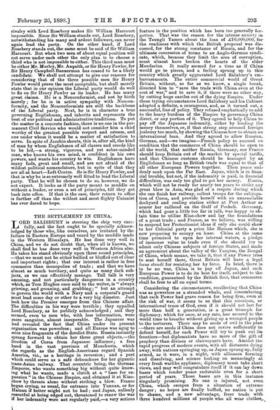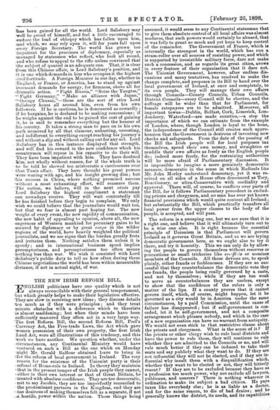THE SETTLEMENT IN CHINA.
TORD SALISBURY is steering the ship very care- fully, and the fact ought to be specially acknow- ledged by those who, like ourselves, are irritated by the failure in Eastern Europe and vexed by the muddle made in the Western Himalaya. He has done very well in China, and we do not doubt that, when all is known, we shall find he has done very well in Western Africa also. He takes his stand obviously upon three sound principles, —that we must not be either bullied or bluffed out of clear and important rights ; that our interest is rather in free commerce than monopolies of trade ; and that we have almost as much territory, and quite as many dark sub- jects, as we can effectively manage. Tall talk is very amusing, and not particularly dangerous in a country which, as Tom Hughes once said to the writer, is " always grieving, and groaning, and grabbing ; " but an attempt to govern the world with a Navy and a corporal's guard must lead some day or other to a very big disaster. Just look how the Premier emerges from this Chinese affair. The difficulties in his way were terrible ; they appalled Lord Rosebery, as he publicly acknowledged ; and they seemed, even to men who, with less information, were more sanguine, almost insuperable. The Japanese war had revealed the fact that China under its present organisation was powerless ; and all Europe was agog to seize nice fragments of the derelict State. Russia instantly sprang forward to obtain her three great objects,—the freedom of Corea from Japanese influence; a free hand in the vast province of Manchuria, which she regards as the English-Americans regard Spanish America, viz., as a heritage in reversion ; and a port which could serve as a safe debouchure for her gigantic trans-Asian railway. That eccentric being, the German Emperor, who wants something big without quite know- ing what he wants, made a clutch at a " base for ex- pansion " in the Chinese Empire, and obtained it at Kiao- chow by threats alone without striking a blow. France began crying, as usual, for entrance into Yunnan, or for Hainan if better might not be had ; and Japan, sullenly resentful at being edged out, threatened to renew the war if her indemnity were not regularly paid,—a very serious feature in the position which has been too generally for- gotten. That was the reason for the intense anxiety in the Tsungli Yamen about the loan of £16,000,000, for the readiness with which the British proposal was dis- cussed, for the strong resistance of Russia, and for the ultimate concession of terms to an Anglo-German syndi- cate, which, because they limit the area of corruption,. must almost have broken the hearts of the elder Mandarins. It really seemed for a time as if China would go to pieces, and a feeling sprung up in this: country which greatly aggravated Lord Salisbury's em- barrassments. The entire commercial world of Great Britain, without, so far as we know, a single break,. directed him to " save the trade with China even at the cost of war," and to save it, if there were no other way, by cutting huge cantles out of the dying Empire. Under these trying circumstances Lord Salisbury and his Cabinet adopted a definite, a courageous, and, as it turned out, a successful, line of policy. They refused emphatically to add to the heavy burdens of the Empire by governing China direct, or any portion of it: They agreed to help China to pay off the Japanese indemnity, either by lending the money themselves, or, if that strong step aroused foreign jealousy too much, by showing the Chinese how to obtain an international loan. And they agreed to allow Russian, German, and—we imagine—French policy to succeed on condition that the commerce of China should be open to all the world, that neither Russia, Germany, nor France should keep Britain out of the market by special tariffs, and that Chinese customs should be managed by an Englishman so long as British trade was equal to that of all other European Powers together. Then peace sud- denly sank upon the Far East. Japan, which is in finan- cial trouble, but not, if the indemnity is paid, in financial difficulties, was only too glad to get her money. Russia, which will not be ready for nearly ten years to strike any great blow in Asia, was glad of a respite during which she can finish her railway, collect troops for the subjuga- tion of Corea, and provide herself with an unassailable dockyard and coaling station either at Port Arthur or nearer her railhead on the Gulf of Pecheli. Germany, which had gone a little too far in talk, was happy to ob- tain time to utilise Kiao-chow and lay the foundations of a great trade ; and France, as we believe, was willing to suspend her Protectionist ideas if only she could show to her Colonial party a prize like Hainan which, she is now preparing to occupy on lease. China at the same time promised to open her internal waters, a pledge of immense value to trade even if she should try to admit only Chinese subjects of foreign States, and made an agreement about the valley of the Yangtse, the Bengal of China, which means, we take it, that if any Power tries to seat herself there, Great Britain will have a legal locus standi for resisting her by force. In brief, there is to be no war, China is to pay off Japan, and each European Power is to do its best for itself, subject to the condition, guaranteed by the British fleet, that commerce shall be free to all on equal terms.
Considering the circumstances, recollecting that China was as powerless as a stranded whale, and remembering that each Power had grave reason for being firm, even at the risk of war, it seems to us that this eirenicon, or international truce of God, even if it should not last for more than half a generation, is a great triumph for diplomacy, which for once, at any rate, has secured to the world time to breathe without giving up a wronged people to the torturers. There may be seeds of evil in the plan —there are seeds if China does not revive sufficiently to defend herself, for each Power will try to push out its frontiers—but diplomatists have no more of the gift of prophecy than divines or clairvoyants have. Amidst the rapid progress of modern events, with all distances dying away, with nations springing up, as Japan sprang up, fully armed, as it were, in a night, with alliances forming and dissolving, and science looking on menacingly at every fresh warlike appliance, diplomacy must take short views, and may well congratulate itself if it can lay down bases which render peace endurable even for a short period of years. Those bases are in this instance singularly promising. No one is injured, not even China, which escapes from a situation of extreme danger ; no hopes are finally baffled, no nation is put to shame, and a new advantage, freer trade with three hundred millions of people who all wear clothes,., has been gained for all the world. Lord Salisbury may well be proud of himself, and feel a little encouraged to 'endure the load of obloquy which has fallen upon him, and which, we may rely upon it, will for years fall upon -every Foreign Secretary. The world has grown too impatient for the processes of diplomacy, especially as snanaged by statesmen who reflect, who look all round, and who refuse to appeal to the rifle unless convinced that *the subject of quarrel is an adequate one. That, it is clear from this Chinese affair, is Lord Salisbury's position, and it is one which demands in him who occupies it the highest -civil fortitude. A Foreign Minister in our day, whether in :England, or France, or America, has to stand up against incessant demands for energy, for firmness, above all for airamatic action. "Fight Russia," "Seize the Yangtse," Fight Germany." " Make an alliance with Japan," "' Occupy Chusan,"—these are the sort of cries Lord Salisbury hears all around him, even from his own -followers. If he is cautious, he is denounced as cowardly ; if he bargains, he is declared to be making concessions ; if he weighs against the end to be gained the cost of gaining it, he is said to remember everything but the honour of Iris country. It takes a strong man to pace on in his own ,path unmoved by all that clamour, unhasting, unresting, and indifferent to everything except reaching his journey's end without a slip and without calling out for any aid. Lord Salisbury has in this instance displayed that strength, and will find his reward in the new confidence which his countrymen will repose in his capacity to do their will. ' They have been impatient with him. They have doubted itim, not wholly without reason, for if the whole truth is • -to be told he showed too aristocratic a carelessness over that Tunis affair. They have thought his great powers -were waning with age, and his insight growing dim ; but ?this success in China, where nothing promised success "without a most exhausting effort, will reassure them. • The nation, we believe, will in the next crisis pay Lord Salisbury the highest compliment a statesman -can nowadays receive. They will wait contentedly till -he has finished before they begin to complain. We only 'wish we could believe that the journalists would wait too, but that we fear is almost past hoping for. The new ,weight of every event, the new rapidity of communication, the new habit of appealing to opinion, above all, the new -eagerness of Western mankind for pecuniary gains to be secured by diplomacy or by great coups in the wilder -regions of the world, have heavily weighted the political journalists, and we see signs that the burden greatly frets .and irritates them. Nothing satisfies them unless it is :speedy; and in international business speed implies peremptoriness, and peremptoriness too often means nothing less than war. We wish it consisted with Lord :Salisbury's public duty to tell us how often during these 'Chinese negotiations the world has been within measurable distance, if not in actual sight, of war.







































 Previous page
Previous page